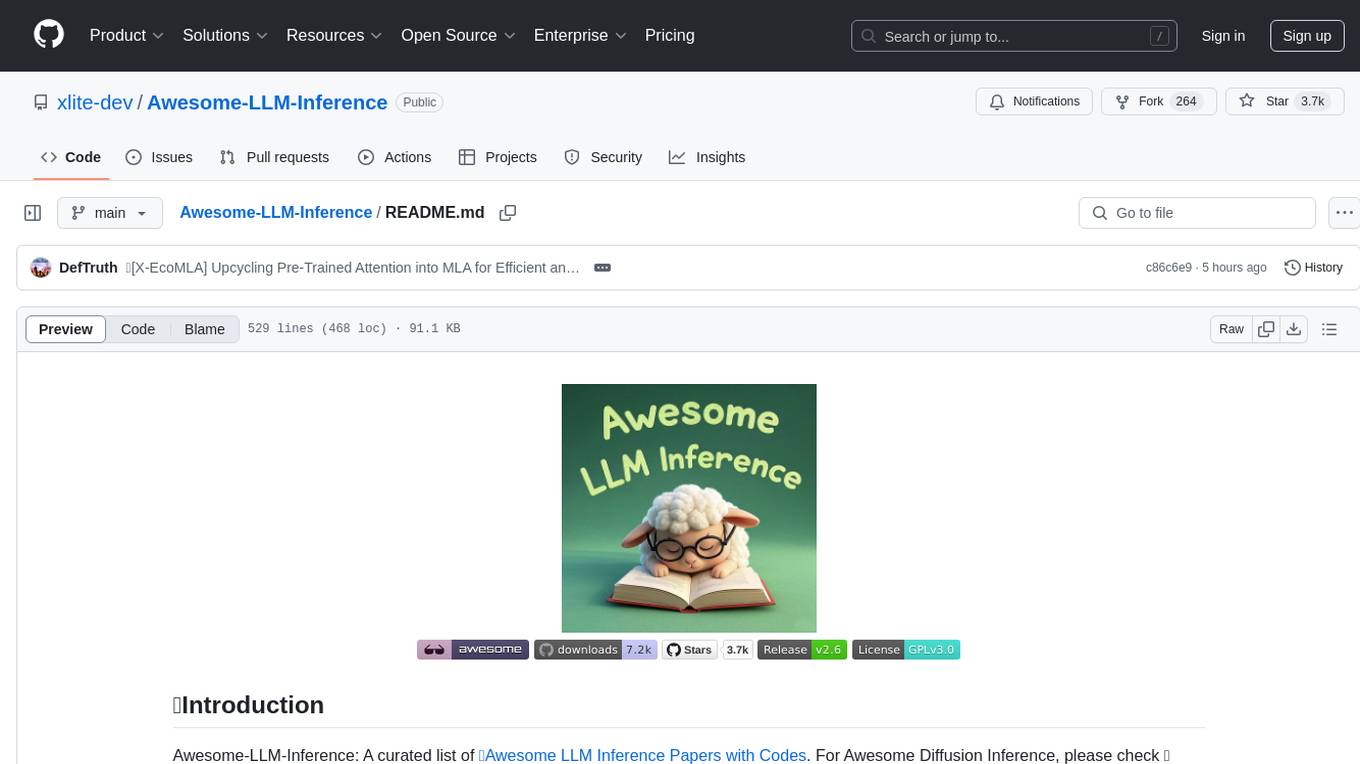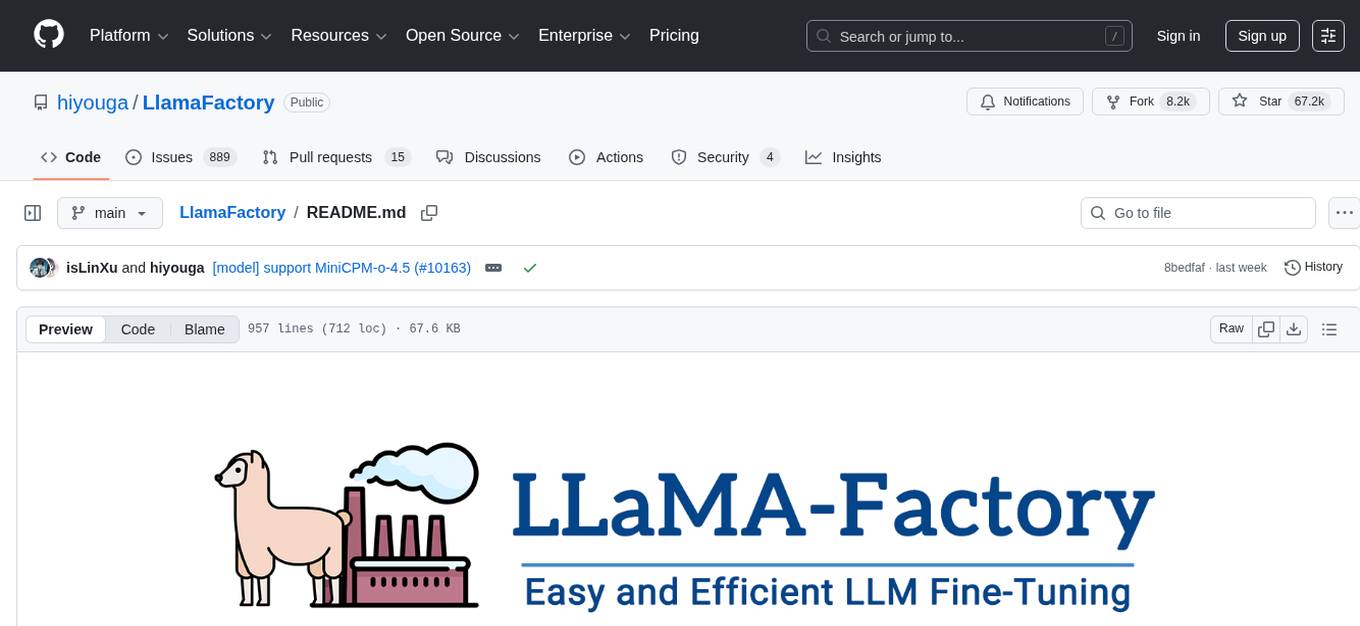
lobe-icons
🥨 Lobe Icons - Popular AI / LLM Model Brand SVG Logo and Icon Collection.
Stars: 417
Lobe Icons is a collection of popular AI / LLM Model Brand SVG logos and icons. It features lightweight and scalable icons designed with highly optimized scalable vector graphics (SVG) for optimal performance. The collection is tree-shakable, allowing users to import only the icons they need to reduce the overall bundle size of their projects. Lobe Icons has an active community of designers and developers who can contribute and seek support on platforms like GitHub and Discord. The repository supports a wide range of brands across different models, providers, and applications, with more brands continuously being added through contributions. Users can easily install Lobe UI with the provided commands and integrate it with NextJS for server-side rendering. Local development can be done using Github Codespaces or by cloning the repository. Contributions are welcome, and users can contribute code by checking out the GitHub Issues. The project is MIT licensed and maintained by LobeHub.
README:


Popular AI / LLM Model Brand SVG Logo and Icon Collection. See them all on one page at lobehub.com/icons.
Contributions, corrections & requests can be made on GitHub.
Table of contents
- 🚀 Lightweight & Scalable: Icons are designed to be lightweight, utilizing highly optimized scalable vector graphics (SVG) for the best performance and quality.
- 🌳 Tree Shakable: The collection is tree-shakable, ensuring that you only import the icons that you use, which helps in reducing the overall bundle size of your project.
- 👥 Active Community: Lobe Icons boasts an active community of designers and developers. Engage with us on platforms like GitHub and Discord to contribute or get support.
Supported brands:
[!TIP]
More brands are being added, andPRwelcome.
Icons can be served from a CDN such as unpkg or npmmirror (aliyun). Simply use the lobe icons npm package and specify a version in the URL like the following:
We provide a CDN service (@lobehub/icons-static-svg) which allows you to use SVG.
<!--UNPKG-->
<img height="64" src="https://unpkg.com/@lobehub/icons-static-svg@latest/icons/[ICON SLUG].svg" />
<!--ALIYUN-->
<img
height="64"
src="https://registry.npmmirror.com/@lobehub/icons-static-svg/latest/files/icons/[ICON SLUG].svg"
/><!--UNPKG-->
<img height="64" src="https://unpkg.com/@lobehub/icons-static-svg@latest/icons/openai.svg" />
<!--ALIYUN-->
<img
height="64"
src="https://registry.npmmirror.com/@lobehub/icons-static-svg/latest/files/icons/openai.svg"
/><!--UNPKG-->
<img height="64" src="https://unpkg.com/@lobehub/icons-static-svg@latest/icons/openai-text.svg" />
<!--ALIYUN-->
<img
height="64"
src="https://registry.npmmirror.com/@lobehub/icons-static-svg/latest/files/icons/openai-text.svg"
/>We provide a CDN service (@lobehub/icons-static-png) which allows you to use PNG.
<!--UNPKG-->
<picture>
<source
media="(prefers-color-scheme: dark)"
srcset="https://unpkg.com/@lobehub/icons-static-png@latest/dark/[ICON SLUG].png"
/>
<img height="64" src="https://unpkg.com/@lobehub/icons-static-png@latest/light/[ICON SLUG].png" />
</picture>
<!--ALIYUN-->
<picture>
<source
media="(prefers-color-scheme: dark)"
srcset="https://registry.npmmirror.com/@lobehub/icons-static-png/latest/files/dark/[ICON SLUG].png"
/>
<img
height="64"
src="https://registry.npmmirror.com/@lobehub/icons-static-png/latest/files/light/[ICON SLUG].png"
/>
</picture>
<!--UNPKG-->
<picture>
<source
media="(prefers-color-scheme: dark)"
srcset="https://unpkg.com/@lobehub/icons-static-png@latest/dark/openai.png"
/>
<img height="64" src="https://unpkg.com/@lobehub/icons-static-png@latest/light/openai.png" />
</picture>
<!--ALIYUN-->
<picture>
<source
media="(prefers-color-scheme: dark)"
srcset="https://registry.npmmirror.com/@lobehub/icons-static-png/latest/files/dark/openai.png"
/>
<img
height="64"
src="https://registry.npmmirror.com/@lobehub/icons-static-png/latest/files/light/openai.png"
/>
</picture>
<!--UNPKG-->
<picture>
<source
media="(prefers-color-scheme: dark)"
srcset="https://unpkg.com/@lobehub/icons-static-png@latest/dark/openai-text.png"
/>
<img height="64" src="https://unpkg.com/@lobehub/icons-static-png@latest/light/openai-text.png" />
</picture>
<!--ALIYUN-->
<picture>
<source
media="(prefers-color-scheme: dark)"
srcset="
https://registry.npmmirror.com/@lobehub/icons-static-png/latest/files/dark/openai-text.png
"
/>
<img
height="64"
src="https://registry.npmmirror.com/@lobehub/icons-static-png/latest/files/light/openai-text.png"
/>
</picture>We provide a CDN service (@lobehub/icons-static-webp) which allows you to use WEBP.
<!--UNPKG-->
<picture>
<source
media="(prefers-color-scheme: dark)"
srcset="https://unpkg.com/@lobehub/icons-static-webp@latest/dark/[ICON SLUG].webp"
/>
<img
height="64"
src="https://unpkg.com/@lobehub/icons-static-webp@latest/light/[ICON SLUG].webp"
/>
</picture>
<!--ALIYUN-->
<picture>
<source
media="(prefers-color-scheme: dark)"
srcset="https://registry.npmmirror.com/@lobehub/icons-static-webp/latest/files/dark/[ICON SLUG].webp"
/>
<img
height="64"
src="https://registry.npmmirror.com/@lobehub/icons-static-webp/latest/files/light/[ICON SLUG].webp"
/>
</picture>
<!--UNPKG-->
<picture>
<source
media="(prefers-color-scheme: dark)"
srcset="https://unpkg.com/@lobehub/icons-static-webp@latest/dark/openai.webp"
/>
<img height="64" src="https://unpkg.com/@lobehub/icons-static-webp@latest/light/openai.webp" />
</picture>
<!--ALIYUN-->
<picture>
<source
media="(prefers-color-scheme: dark)"
srcset="https://registry.npmmirror.com/@lobehub/icons-static-webp/latest/files/dark/openai.webp"
/>
<img
height="64"
src="https://registry.npmmirror.com/@lobehub/icons-static-webp/latest/files/light/openai.webp"
/>
</picture>
<!--UNPKG-->
<picture>
<source
media="(prefers-color-scheme: dark)"
srcset="https://unpkg.com/@lobehub/icons-static-webp@latest/dark/openai-text.webp"
/>
<img
height="64"
src="https://unpkg.com/@lobehub/icons-static-webp@latest/light/openai-text.webp"
/>
</picture>
<!--ALIYUN-->
<picture>
<source
media="(prefers-color-scheme: dark)"
srcset="
https://registry.npmmirror.com/@lobehub/icons-static-webp/latest/files/dark/openai-text.webp
"
/>
<img
height="64"
src="https://registry.npmmirror.com/@lobehub/icons-static-webp/latest/files/light/openai-text.webp"
/>
</picture>| Package | FileType | Version |
|---|---|---|
| @lobehub/icons-static-svg | SVG |
|
| @lobehub/icons-static-png | PNG |
|
| @lobehub/icons-static-webp | WEBP |
[!IMPORTANT]
This package is ESM only.
To install Lobe UI, run the following command:
$ bun add @lobehub/icons[!NOTE]
By work correct with nextjs ssr, addtranspilePackages: ['@lobehub/icons']tonext.config.js. For example:
// next.config.js
const nextConfig = {
// ...other config
transpilePackages: ['@lobehub/icons'],
};You can use Github Codespaces for online development:
Or clone it for local development:
$ git clone https://github.com/lobehub/lobe-icons.git
$ cd lobe-icons
$ bun install
$ bun startContributions of all types are more than welcome, if you are interested in contributing code, feel free to check out our GitHub Issues to get stuck in to show us what you’re made of.
Every bit counts and your one-time donation sparkles in our galaxy of support! You're a shooting star, making a swift and bright impact on our journey. Thank you for believing in us – your generosity guides us toward our mission, one brilliant flash at a time.

- 🤯 Lobe Chat - An open-source, extensible (Function Calling), high-performance chatbot framework. It supports one-click free deployment of your private ChatGPT/LLM web application.
-
🅰️ Lobe Theme - The modern theme for stable diffusion webui, exquisite interface design, highly customizable UI, and efficiency boosting features. - 🧸 Lobe Vidol - Experience the magic of virtual idol creation with Lobe Vidol, enjoy the elegance of our Exquisite UI Design, dance along using MMD Dance Support, and engage in Smooth Conversations.
- 🍭 Lobe UI - An open-source UI component library for building AIGC web apps.
- 🥨 Lobe Icons - Popular AI / LLM Model Brand SVG Logo and Icon Collection.
- 📊 Lobe Charts - React modern charts components built on recharts
- 🎤 Lobe TTS - A high-quality & reliable TTS/STT library for Server and Browser
- 🌏 Lobe i18n - Automation ai tool for the i18n (internationalization) translation process.
For Tasks:
Click tags to check more tools for each tasksFor Jobs:
Alternative AI tools for lobe-icons
Similar Open Source Tools
lobe-icons
Lobe Icons is a collection of popular AI / LLM Model Brand SVG logos and icons. It features lightweight and scalable icons designed with highly optimized scalable vector graphics (SVG) for optimal performance. The collection is tree-shakable, allowing users to import only the icons they need to reduce the overall bundle size of their projects. Lobe Icons has an active community of designers and developers who can contribute and seek support on platforms like GitHub and Discord. The repository supports a wide range of brands across different models, providers, and applications, with more brands continuously being added through contributions. Users can easily install Lobe UI with the provided commands and integrate it with NextJS for server-side rendering. Local development can be done using Github Codespaces or by cloning the repository. Contributions are welcome, and users can contribute code by checking out the GitHub Issues. The project is MIT licensed and maintained by LobeHub.
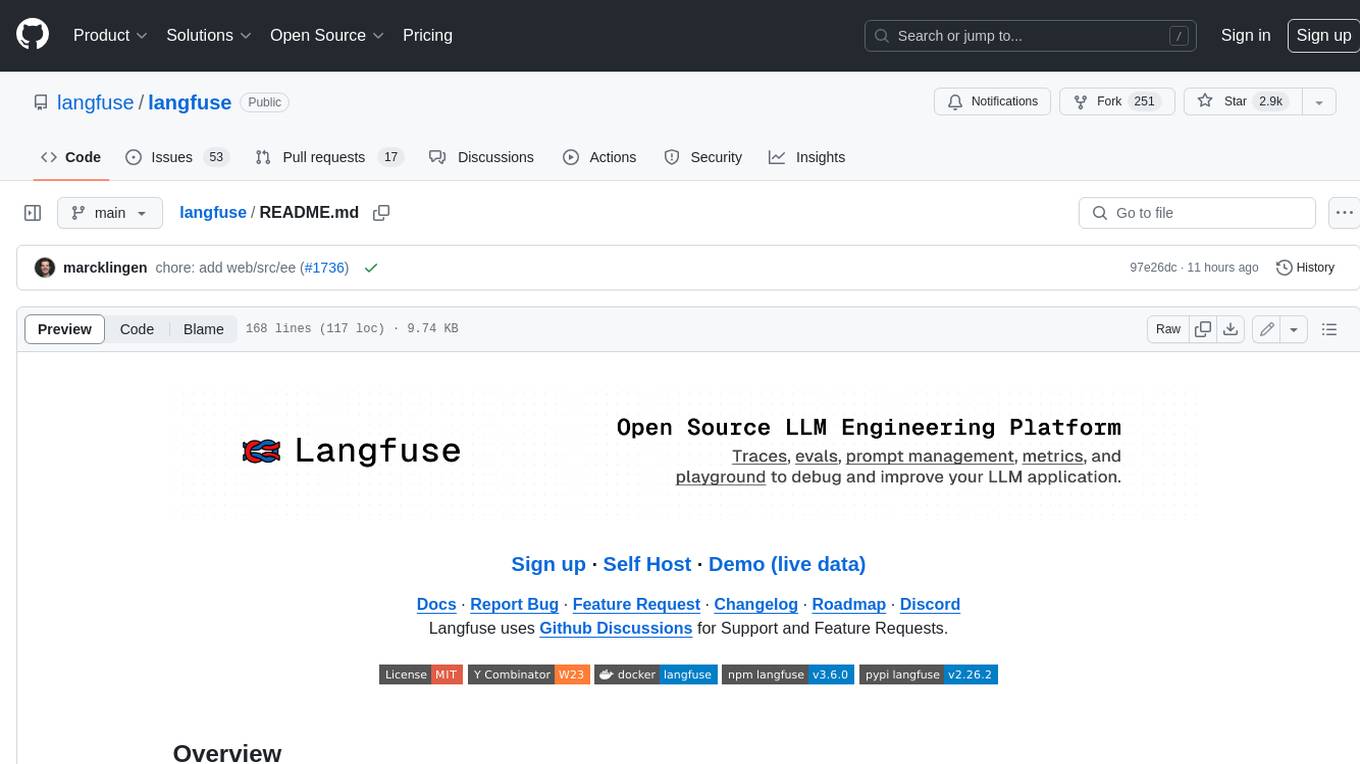
langfuse
Langfuse is a powerful tool that helps you develop, monitor, and test your LLM applications. With Langfuse, you can: * **Develop:** Instrument your app and start ingesting traces to Langfuse, inspect and debug complex logs, and manage, version, and deploy prompts from within Langfuse. * **Monitor:** Track metrics (cost, latency, quality) and gain insights from dashboards & data exports, collect and calculate scores for your LLM completions, run model-based evaluations, collect user feedback, and manually score observations in Langfuse. * **Test:** Track and test app behaviour before deploying a new version, test expected in and output pairs and benchmark performance before deploying, and track versions and releases in your application. Langfuse is easy to get started with and offers a generous free tier. You can sign up for Langfuse Cloud or deploy Langfuse locally or on your own infrastructure. Langfuse also offers a variety of integrations to make it easy to connect to your LLM applications.
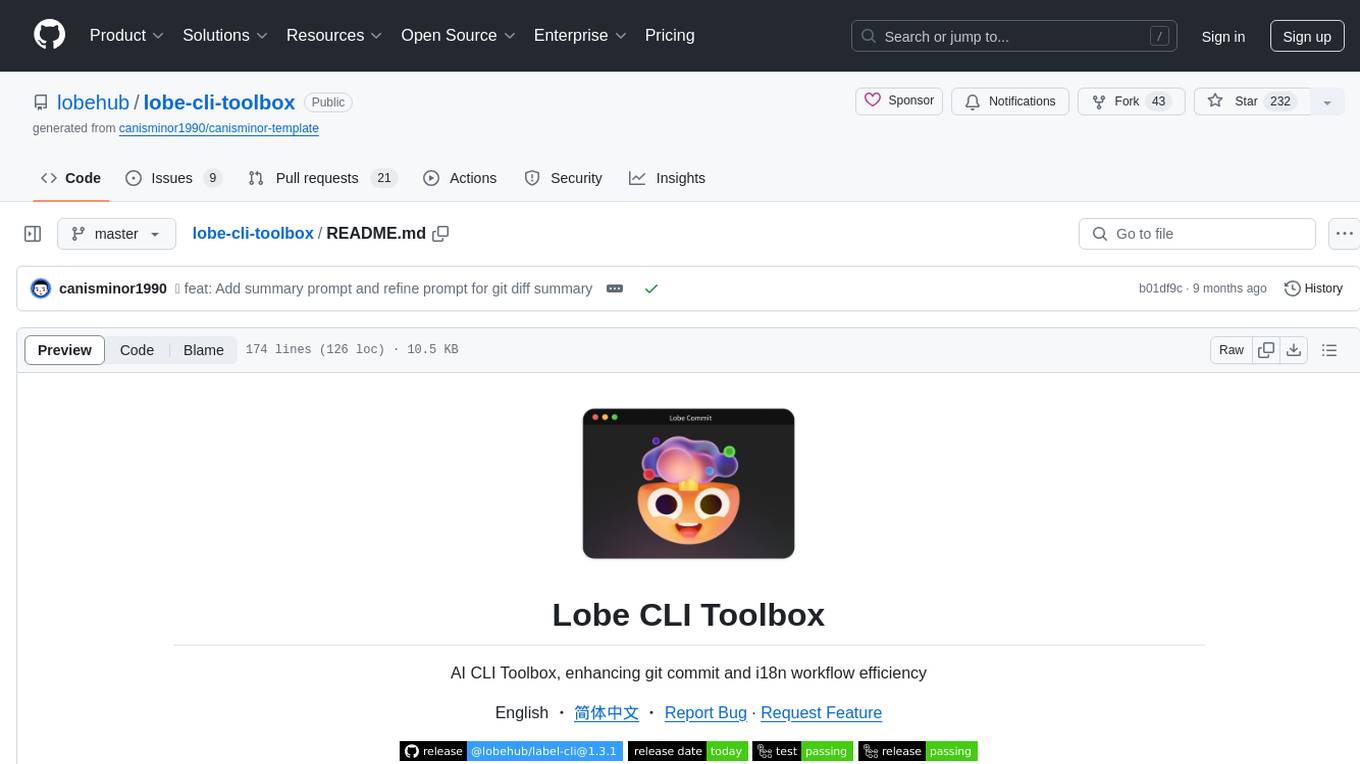
lobe-cli-toolbox
Lobe CLI Toolbox is an AI CLI Toolbox designed to enhance git commit and i18n workflow efficiency. It includes tools like Lobe Commit for generating Gitmoji-based commit messages and Lobe i18n for automating the i18n translation process. The toolbox also features Lobe label for automatically copying issues labels from a template repo. It supports features such as automatic splitting of large files, incremental updates, and customization options for the OpenAI model, API proxy, and temperature.
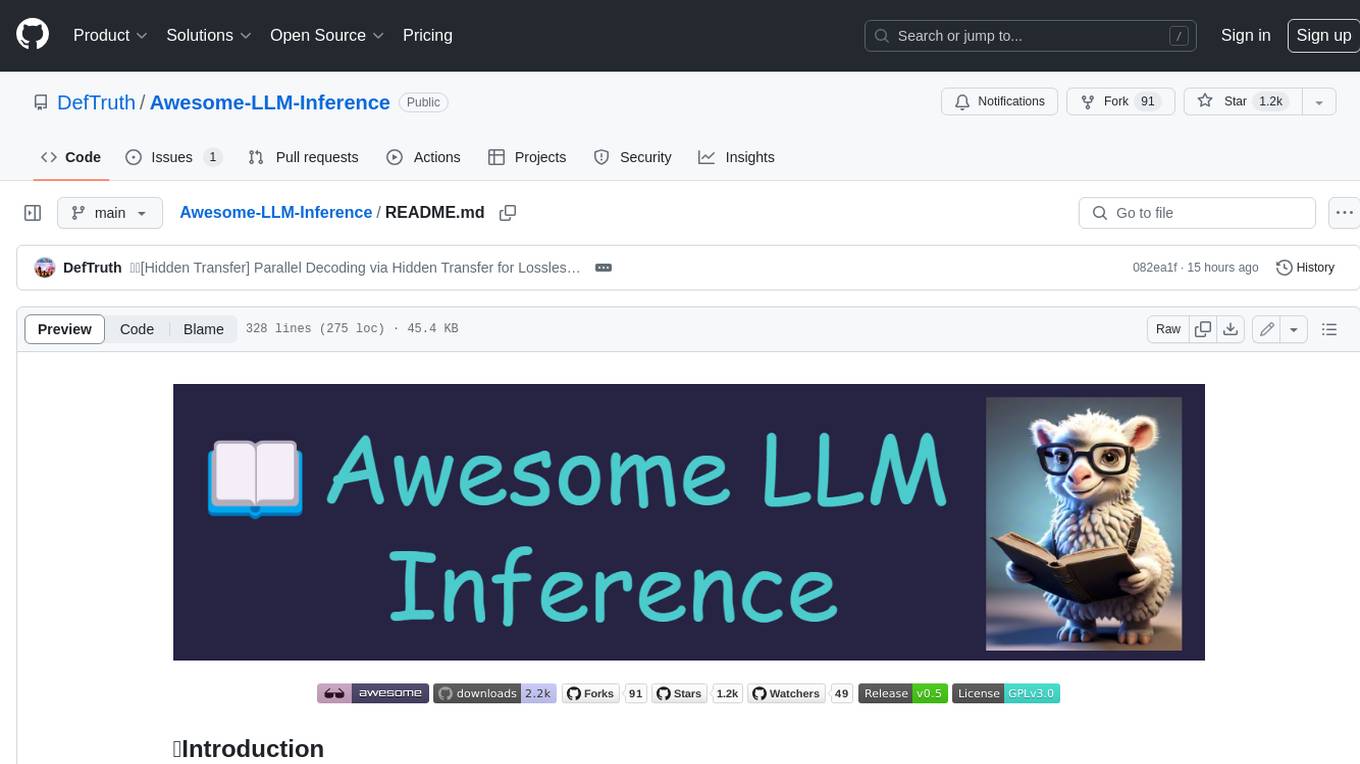
Awesome-LLM-Inference
Awesome-LLM-Inference: A curated list of 📙Awesome LLM Inference Papers with Codes, check 📖Contents for more details. This repo is still updated frequently ~ 👨💻 Welcome to star ⭐️ or submit a PR to this repo!
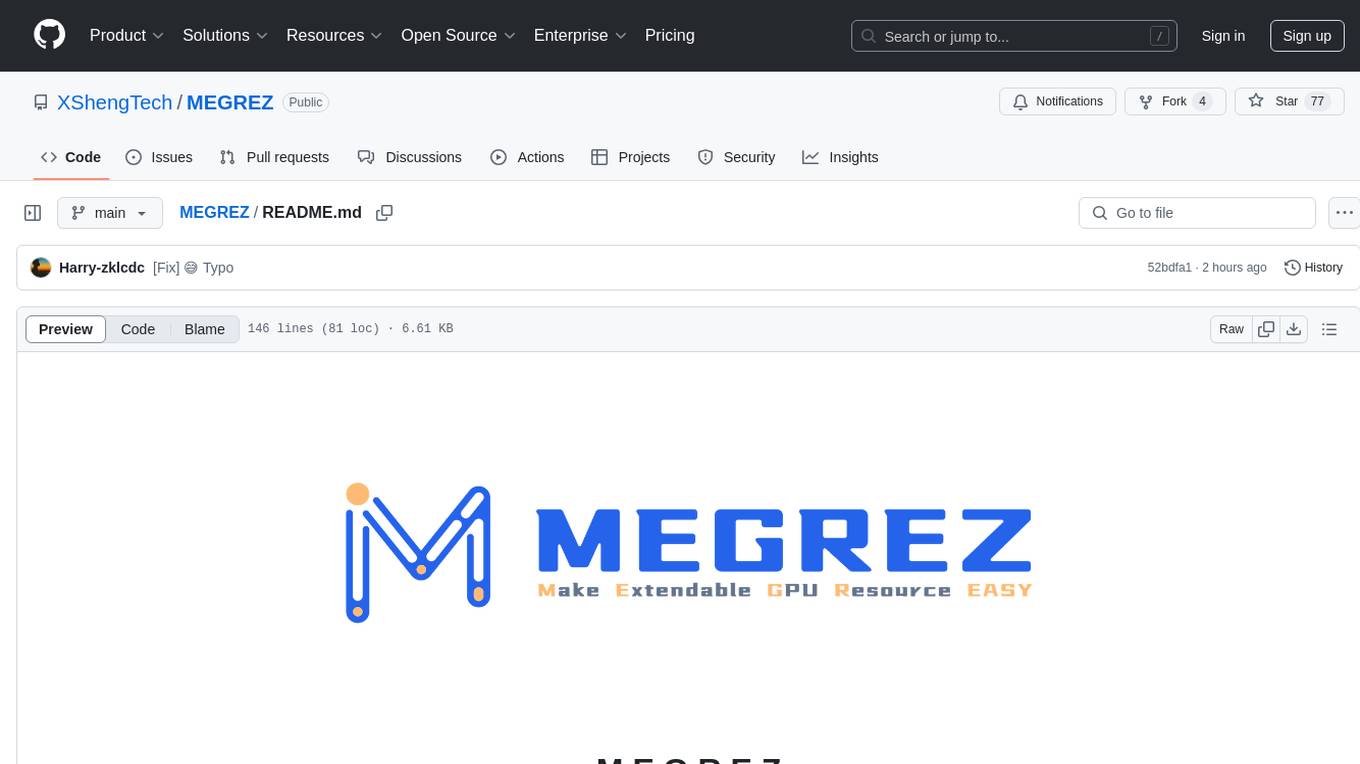
MEGREZ
MEGREZ is a modern and elegant open-source high-performance computing platform that efficiently manages GPU resources. It allows for easy container instance creation, supports multiple nodes/multiple GPUs, modern UI environment isolation, customizable performance configurations, and user data isolation. The platform also comes with pre-installed deep learning environments, supports multiple users, features a VSCode web version, resource performance monitoring dashboard, and Jupyter Notebook support.
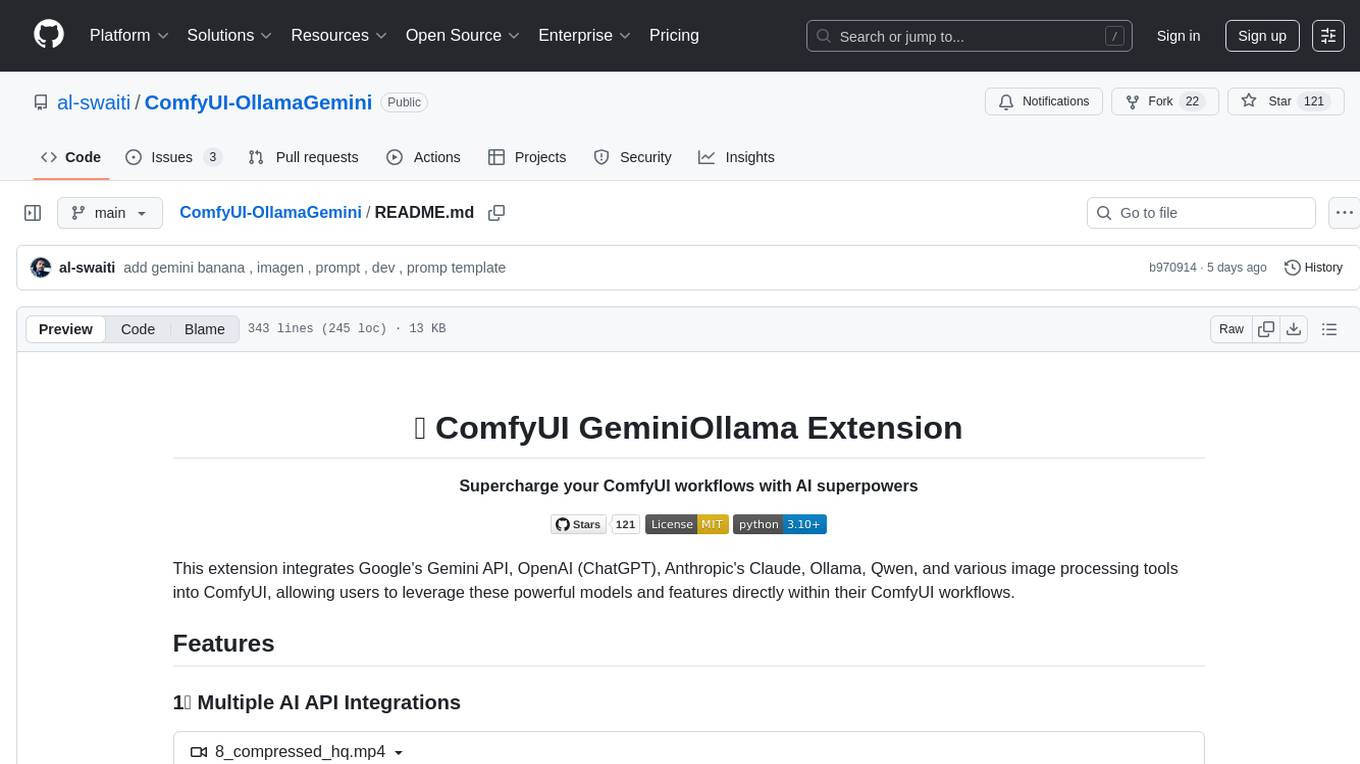
ComfyUI-OllamaGemini
ComfyUI GeminiOllama Extension integrates Google's Gemini API, OpenAI (ChatGPT), Anthropic's Claude, Ollama, Qwen, and image processing tools into ComfyUI for leveraging powerful models and features directly within workflows. Features include multiple AI API integrations, advanced prompt engineering, Gemini image generation, background removal, SVG conversion, FLUX resolutions, ComfyUI Styler, smart prompt generator, and more. The extension offers comprehensive API integration, advanced prompt engineering with researched templates, high-quality tools like Smart Prompt Generator and BRIA RMBG, and supports video & audio processing. It provides a single interface to access powerful AI models, transform prompts into detailed instructions, and use various tools for image processing, styling, and content generation.
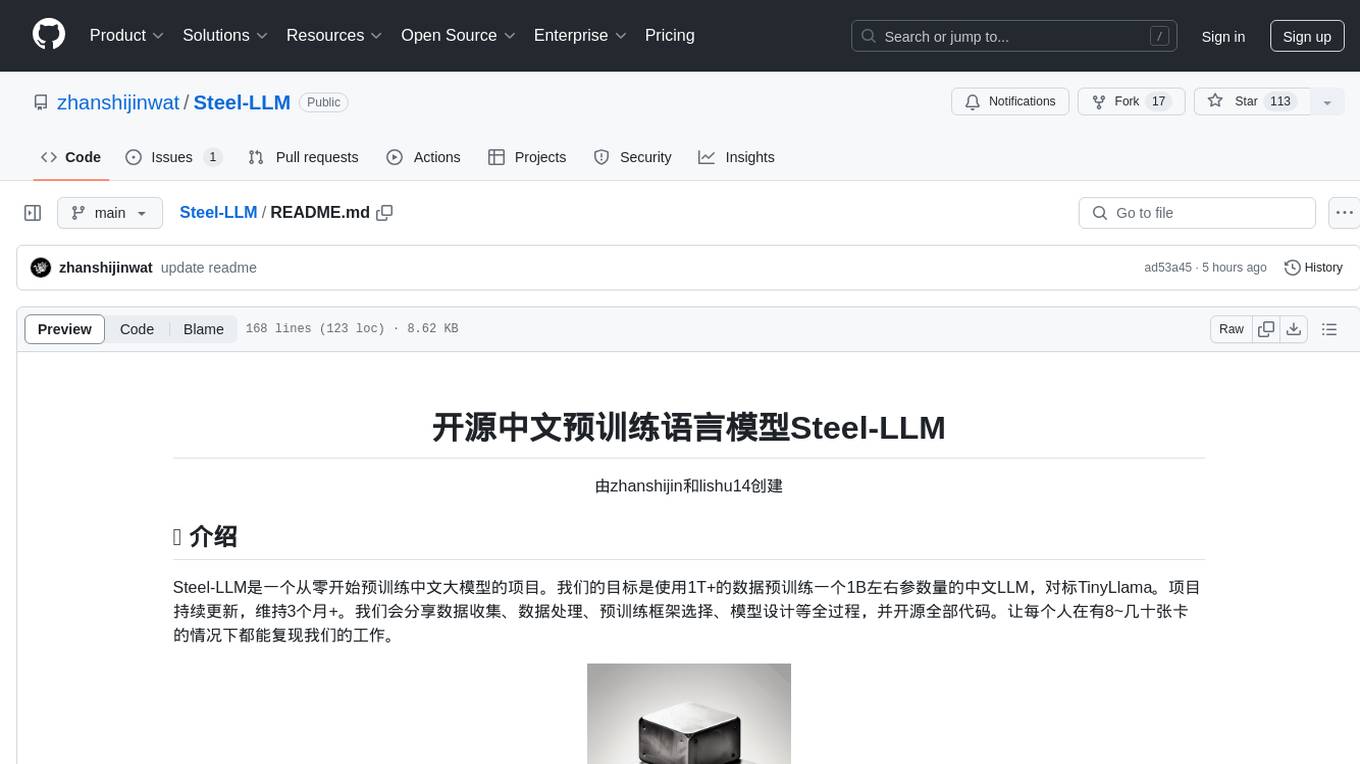
Steel-LLM
Steel-LLM is a project to pre-train a large Chinese language model from scratch using over 1T of data to achieve a parameter size of around 1B, similar to TinyLlama. The project aims to share the entire process including data collection, data processing, pre-training framework selection, model design, and open-source all the code. The goal is to enable reproducibility of the work even with limited resources. The name 'Steel' is inspired by a band '万能青年旅店' and signifies the desire to create a strong model despite limited conditions. The project involves continuous data collection of various cultural elements, trivia, lyrics, niche literature, and personal secrets to train the LLM. The ultimate aim is to fill the model with diverse data and leave room for individual input, fostering collaboration among users.
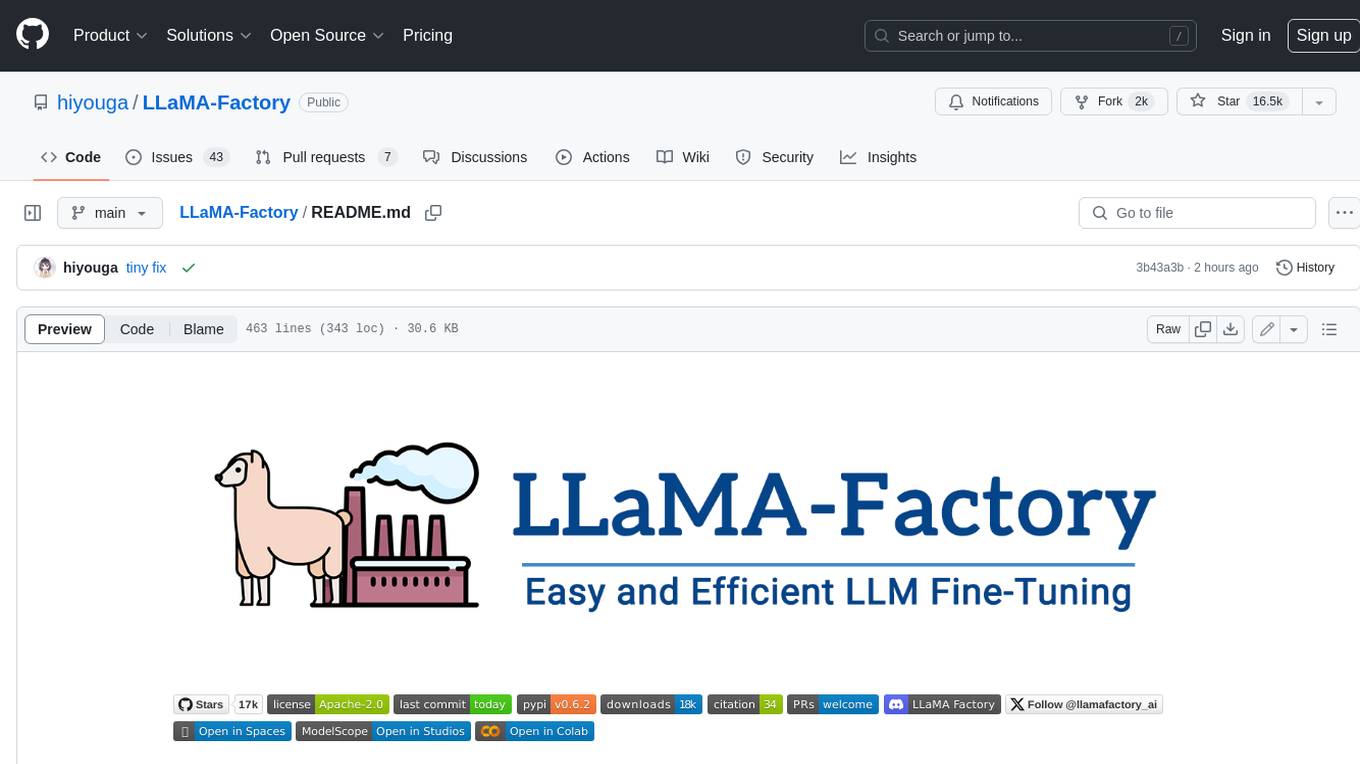
LLaMA-Factory
LLaMA Factory is a unified framework for fine-tuning 100+ large language models (LLMs) with various methods, including pre-training, supervised fine-tuning, reward modeling, PPO, DPO and ORPO. It features integrated algorithms like GaLore, BAdam, DoRA, LongLoRA, LLaMA Pro, LoRA+, LoftQ and Agent tuning, as well as practical tricks like FlashAttention-2, Unsloth, RoPE scaling, NEFTune and rsLoRA. LLaMA Factory provides experiment monitors like LlamaBoard, TensorBoard, Wandb, MLflow, etc., and supports faster inference with OpenAI-style API, Gradio UI and CLI with vLLM worker. Compared to ChatGLM's P-Tuning, LLaMA Factory's LoRA tuning offers up to 3.7 times faster training speed with a better Rouge score on the advertising text generation task. By leveraging 4-bit quantization technique, LLaMA Factory's QLoRA further improves the efficiency regarding the GPU memory.
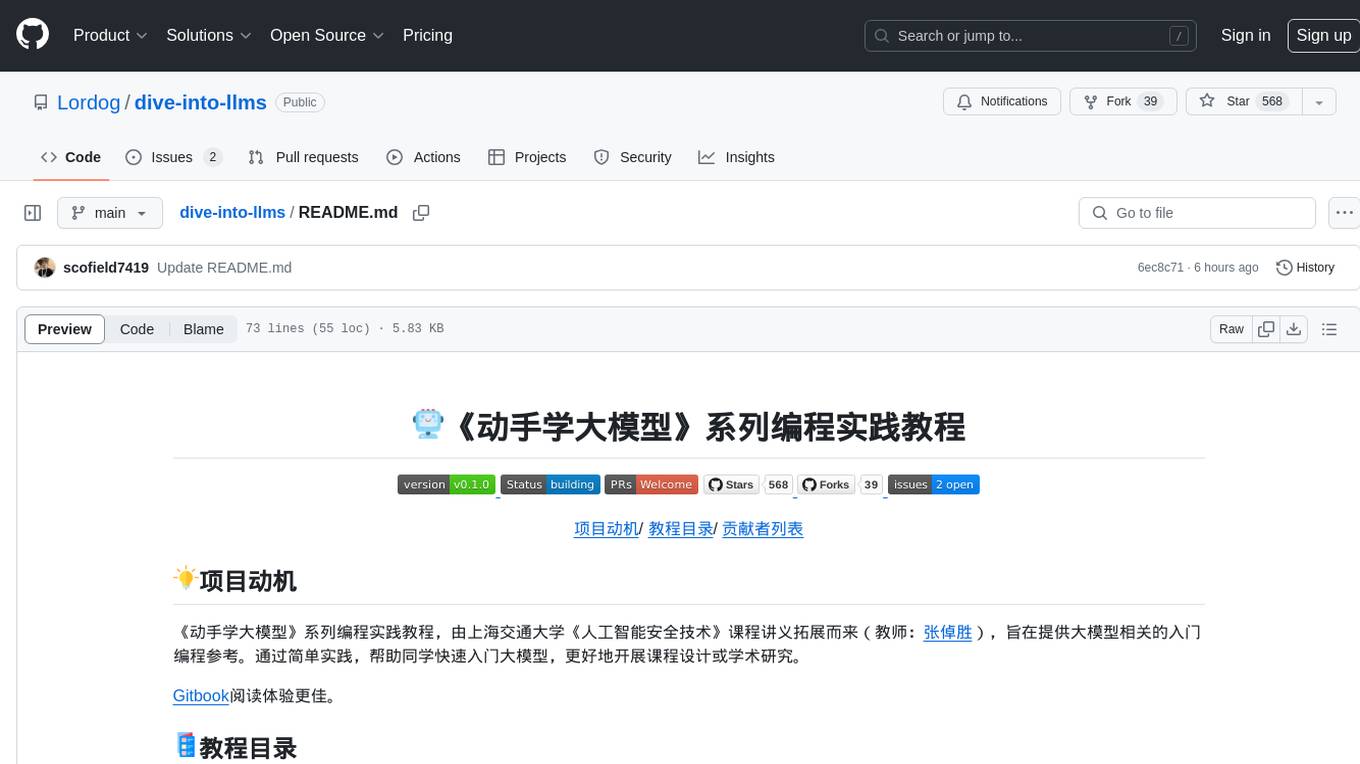
dive-into-llms
The 'Dive into Large Language Models' series programming practice tutorial is an extension of the 'Artificial Intelligence Security Technology' course lecture notes from Shanghai Jiao Tong University (Instructor: Zhang Zhuosheng). It aims to provide introductory programming references related to large models. Through simple practice, it helps students quickly grasp large models, better engage in course design, or academic research. The tutorial covers topics such as fine-tuning and deployment, prompt learning and thought chains, knowledge editing, model watermarking, jailbreak attacks, multimodal models, large model intelligent agents, and security. Disclaimer: The content is based on contributors' personal experiences, internet data, and accumulated research work, provided for reference only.
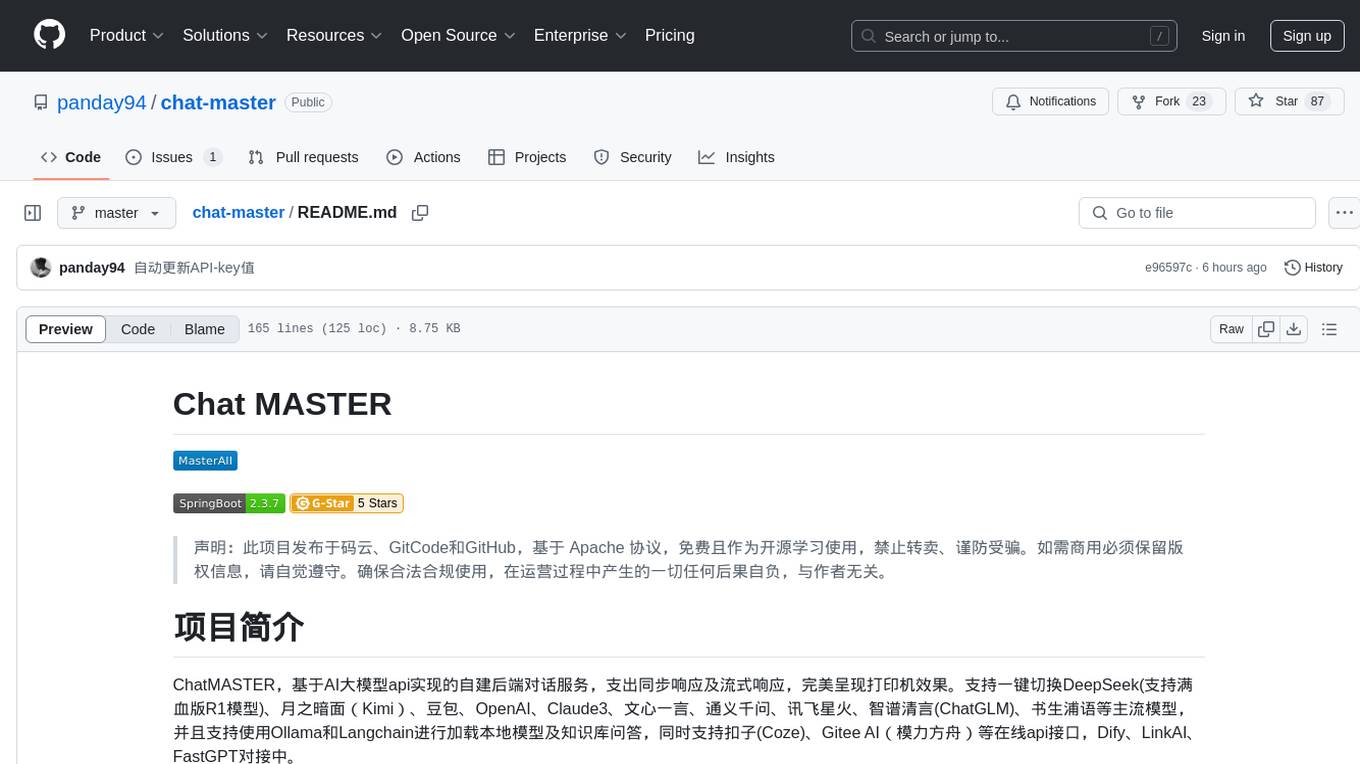
chat-master
ChatMASTER is a self-built backend conversation service based on AI large model APIs, supporting synchronous and streaming responses with perfect printer effects. It supports switching between mainstream models such as DeepSeek, Kimi, Doubao, OpenAI, Claude3, Yiyan, Tongyi, Xinghuo, ChatGLM, Shusheng, and more. It also supports loading local models and knowledge bases using Ollama and Langchain, as well as online API interfaces like Coze and Gitee AI. The project includes Java server-side, web-side, mobile-side, and management background configuration. It provides various assistant types for prompt output and allows creating custom assistant templates in the management background. The project uses technologies like Spring Boot, Spring Security + JWT, Mybatis-Plus, Lombok, Mysql & Redis, with easy-to-understand code and comprehensive permission control using JWT authentication system for multi-terminal support.
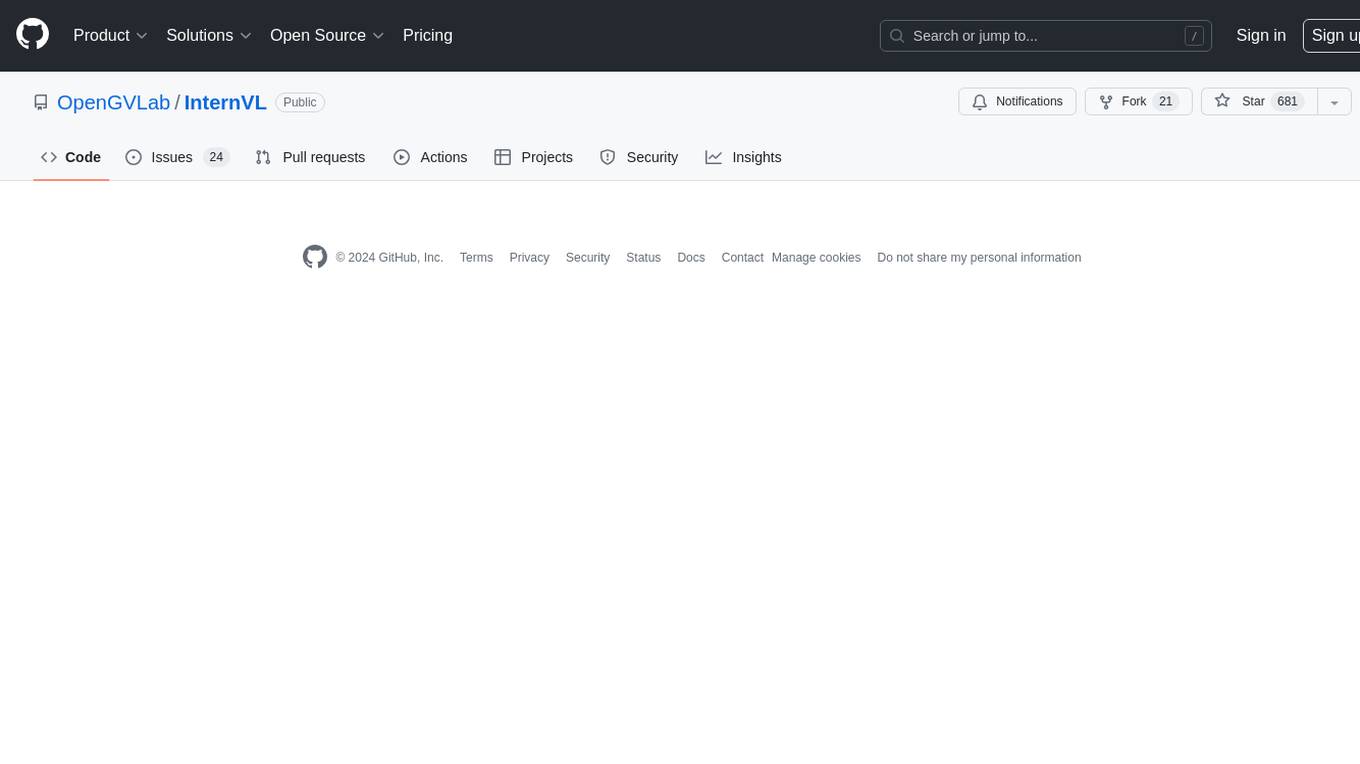
InternVL
InternVL scales up the ViT to _**6B parameters**_ and aligns it with LLM. It is a vision-language foundation model that can perform various tasks, including: **Visual Perception** - Linear-Probe Image Classification - Semantic Segmentation - Zero-Shot Image Classification - Multilingual Zero-Shot Image Classification - Zero-Shot Video Classification **Cross-Modal Retrieval** - English Zero-Shot Image-Text Retrieval - Chinese Zero-Shot Image-Text Retrieval - Multilingual Zero-Shot Image-Text Retrieval on XTD **Multimodal Dialogue** - Zero-Shot Image Captioning - Multimodal Benchmarks with Frozen LLM - Multimodal Benchmarks with Trainable LLM - Tiny LVLM InternVL has been shown to achieve state-of-the-art results on a variety of benchmarks. For example, on the MMMU image classification benchmark, InternVL achieves a top-1 accuracy of 51.6%, which is higher than GPT-4V and Gemini Pro. On the DocVQA question answering benchmark, InternVL achieves a score of 82.2%, which is also higher than GPT-4V and Gemini Pro. InternVL is open-sourced and available on Hugging Face. It can be used for a variety of applications, including image classification, object detection, semantic segmentation, image captioning, and question answering.
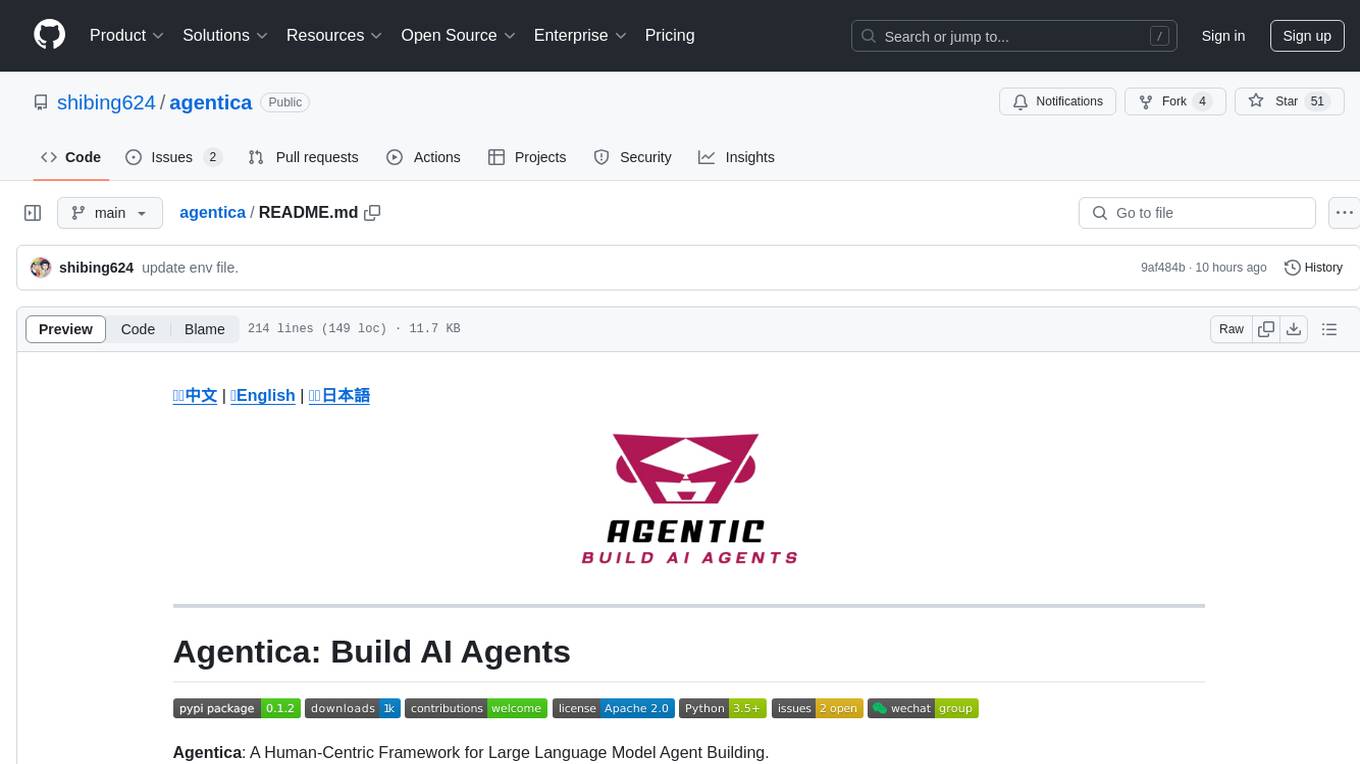
agentica
Agentica is a human-centric framework for building large language model agents. It provides functionalities for planning, memory management, tool usage, and supports features like reflection, planning and execution, RAG, multi-agent, multi-role, and workflow. The tool allows users to quickly code and orchestrate agents, customize prompts, and make API calls to various services. It supports API calls to OpenAI, Azure, Deepseek, Moonshot, Claude, Ollama, and Together. Agentica aims to simplify the process of building AI agents by providing a user-friendly interface and a range of functionalities for agent development.
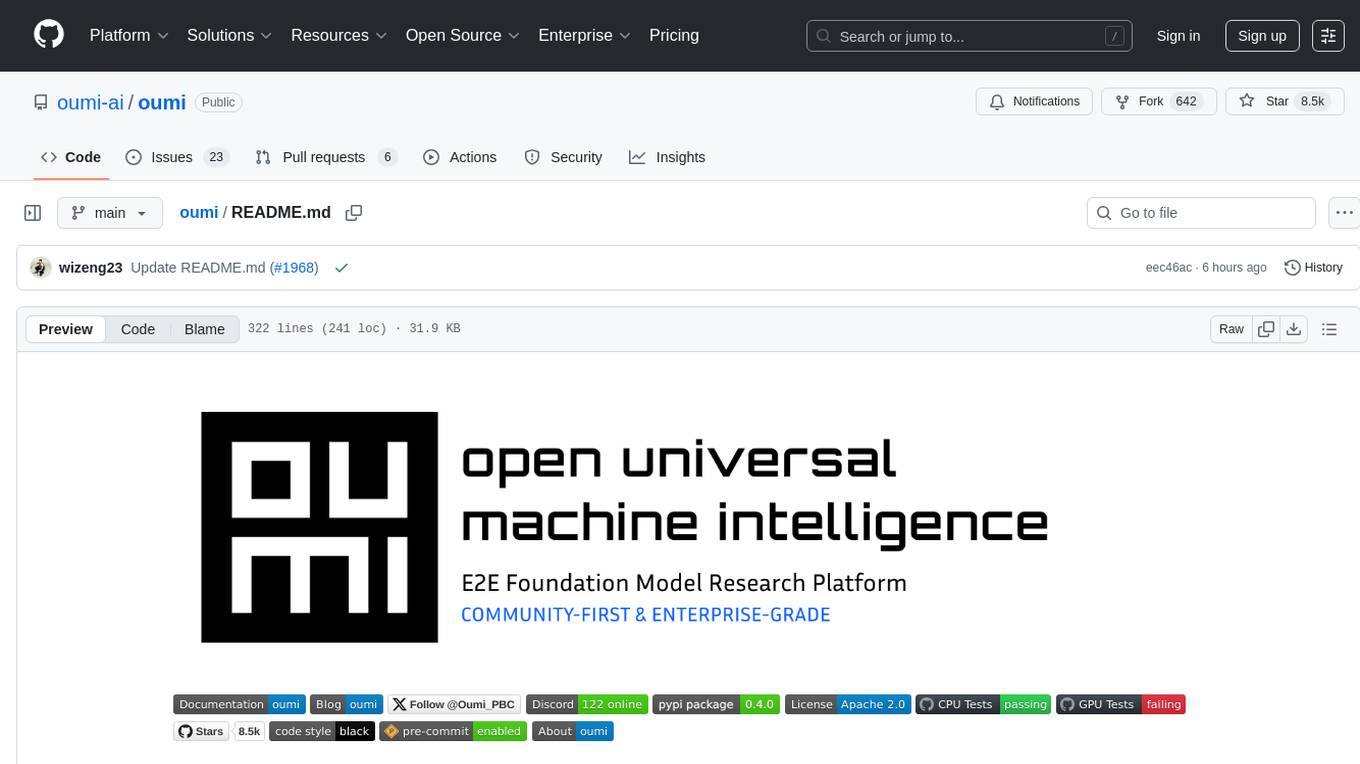
oumi
Oumi is an open-source platform for building state-of-the-art foundation models, offering tools for data preparation, training, evaluation, and deployment. It supports training and fine-tuning models with various parameters, working with text and multimodal models, synthesizing and curating training data, deploying models efficiently, evaluating models comprehensively, and running on different platforms. Oumi provides a consistent API, reliability, and flexibility for research purposes.
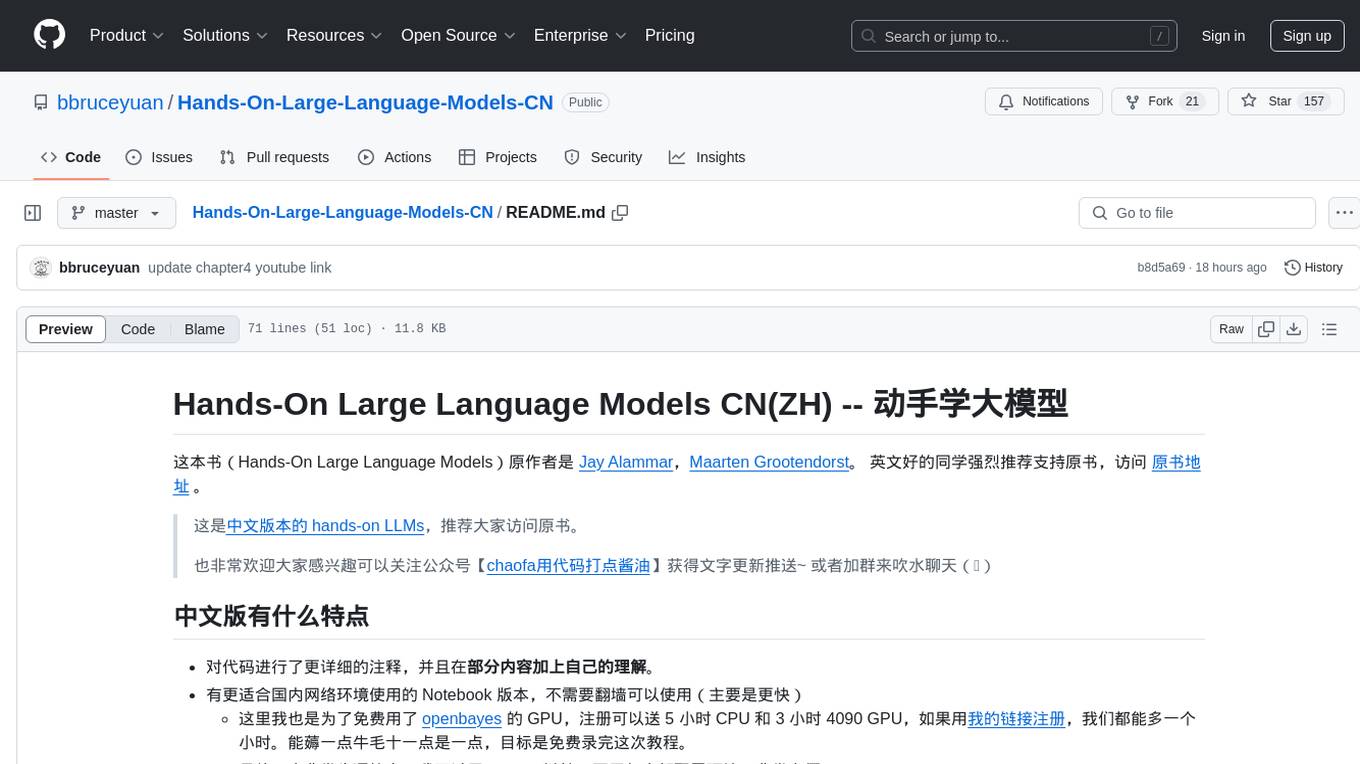
Hands-On-Large-Language-Models-CN
Hands-On Large Language Models CN(ZH) is a Chinese version of the book 'Hands-On Large Language Models' by Jay Alammar and Maarten Grootendorst. It provides detailed code annotations and additional insights, offers Notebook versions suitable for Chinese network environments, utilizes openbayes for free GPU access, allows convenient environment setup with vscode, and includes accompanying Chinese language videos on platforms like Bilibili and YouTube. The book covers various chapters on topics like Tokens and Embeddings, Transformer LLMs, Text Classification, Text Clustering, Prompt Engineering, Text Generation, Semantic Search, Multimodal LLMs, Text Embedding Models, Fine-tuning Models, and more.
For similar tasks

NaLLM
The NaLLM project repository explores the synergies between Neo4j and Large Language Models (LLMs) through three primary use cases: Natural Language Interface to a Knowledge Graph, Creating a Knowledge Graph from Unstructured Data, and Generating a Report using static and LLM data. The repository contains backend and frontend code organized for easy navigation. It includes blog posts, a demo database, instructions for running demos, and guidelines for contributing. The project aims to showcase the potential of Neo4j and LLMs in various applications.
lobe-icons
Lobe Icons is a collection of popular AI / LLM Model Brand SVG logos and icons. It features lightweight and scalable icons designed with highly optimized scalable vector graphics (SVG) for optimal performance. The collection is tree-shakable, allowing users to import only the icons they need to reduce the overall bundle size of their projects. Lobe Icons has an active community of designers and developers who can contribute and seek support on platforms like GitHub and Discord. The repository supports a wide range of brands across different models, providers, and applications, with more brands continuously being added through contributions. Users can easily install Lobe UI with the provided commands and integrate it with NextJS for server-side rendering. Local development can be done using Github Codespaces or by cloning the repository. Contributions are welcome, and users can contribute code by checking out the GitHub Issues. The project is MIT licensed and maintained by LobeHub.
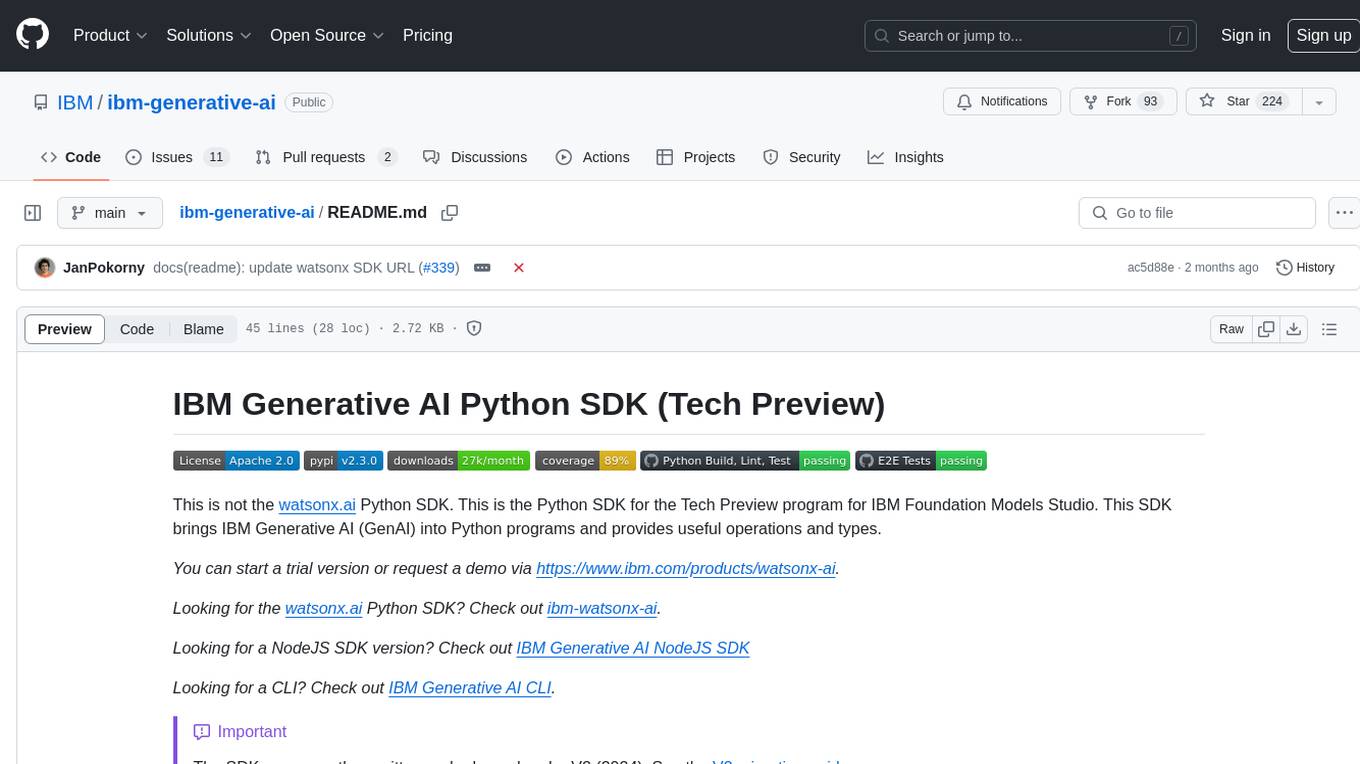
ibm-generative-ai
IBM Generative AI Python SDK is a tool designed for the Tech Preview program for IBM Foundation Models Studio. It brings IBM Generative AI (GenAI) into Python programs, offering various operations and types. Users can start a trial version or request a demo via the provided link. The SDK was recently rewritten and released under V2 in 2024, with a migration guide available. Contributors are welcome to participate in the open-source project by contributing documentation, tests, bug fixes, and new functionality.
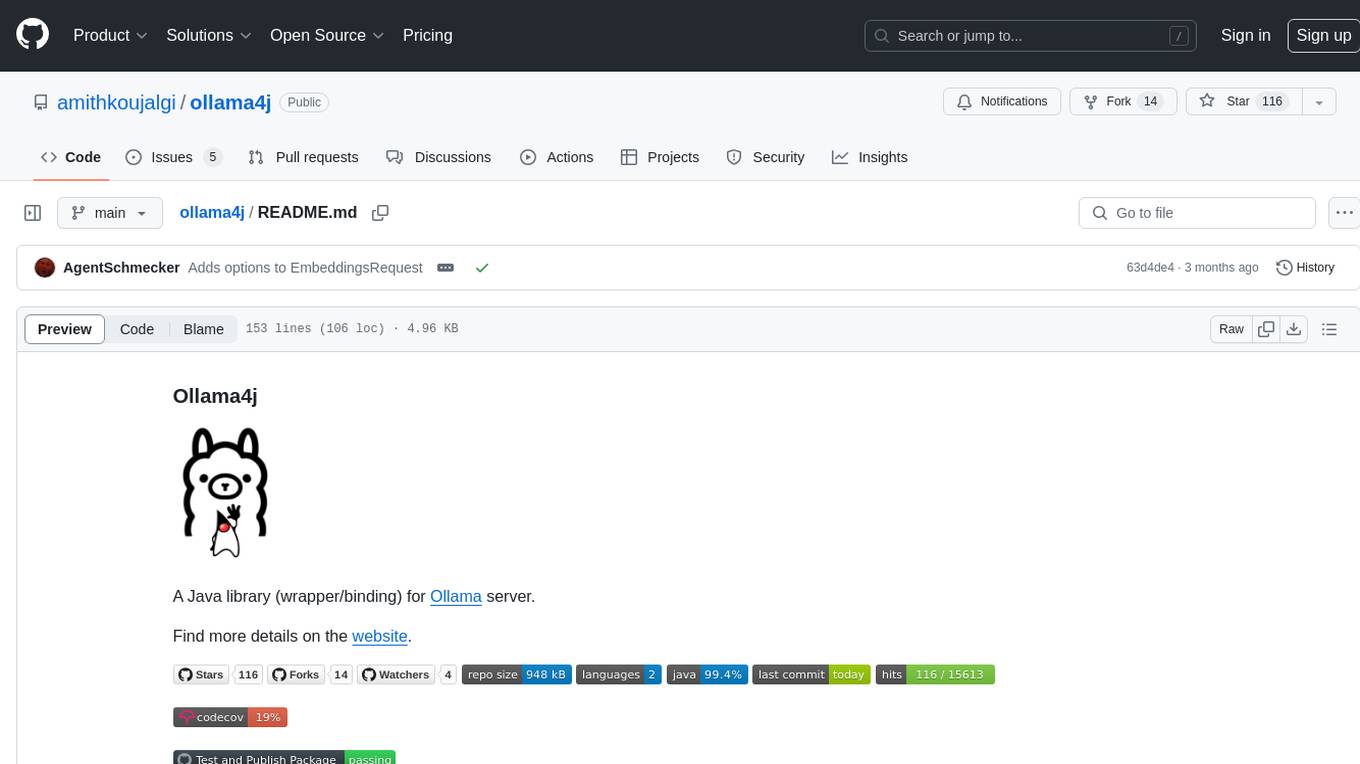
ollama4j
Ollama4j is a Java library that serves as a wrapper or binding for the Ollama server. It facilitates communication with the Ollama server and provides models for deployment. The tool requires Java 11 or higher and can be installed locally or via Docker. Users can integrate Ollama4j into Maven projects by adding the specified dependency. The tool offers API specifications and supports various development tasks such as building, running unit tests, and integration tests. Releases are automated through GitHub Actions CI workflow. Areas of improvement include adhering to Java naming conventions, updating deprecated code, implementing logging, using lombok, and enhancing request body creation. Contributions to the project are encouraged, whether reporting bugs, suggesting enhancements, or contributing code.
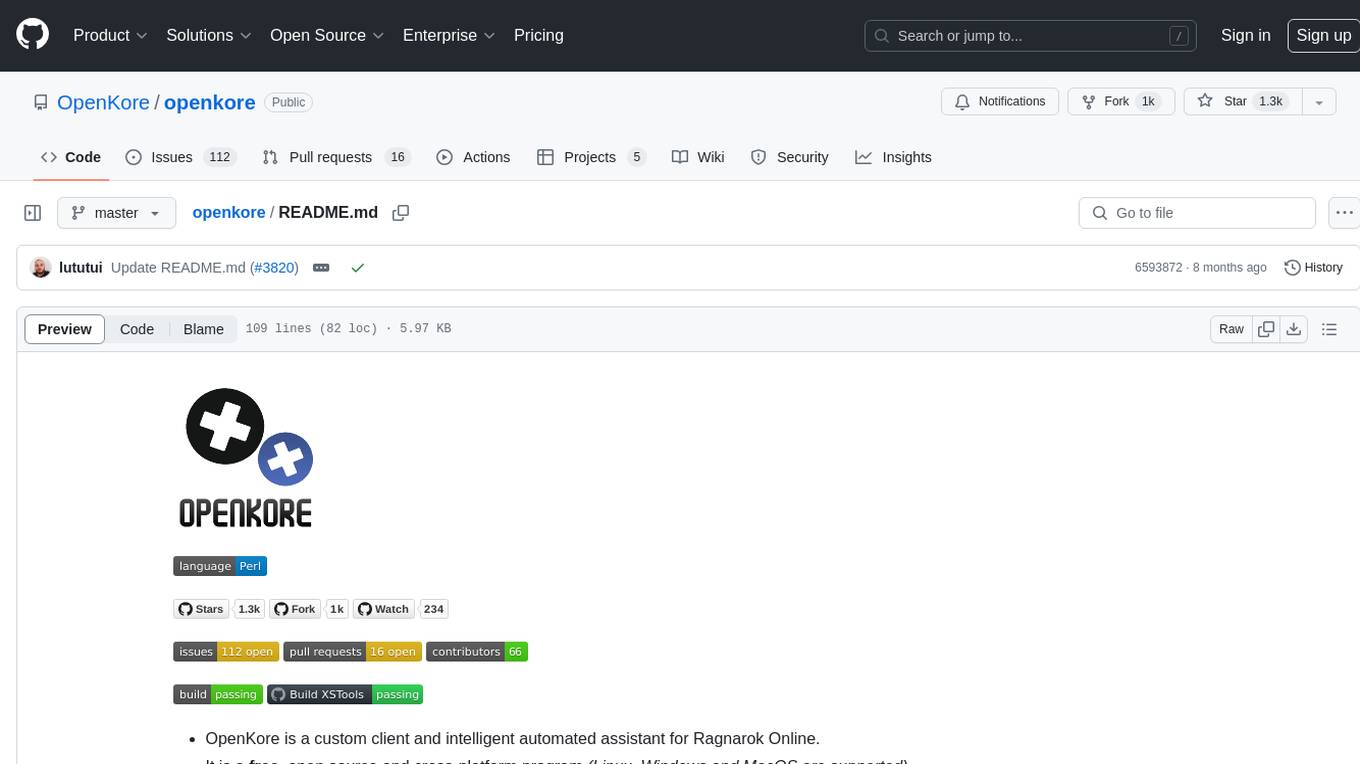
openkore
OpenKore is a custom client and intelligent automated assistant for Ragnarok Online. It is a free, open source, and cross-platform program (Linux, Windows, and MacOS are supported). To run OpenKore, you need to download and extract it or clone the repository using Git. Configure OpenKore according to the documentation and run openkore.pl to start. The tool provides a FAQ section for troubleshooting, guidelines for reporting issues, and information about botting status on official servers. OpenKore is developed by a global team, and contributions are welcome through pull requests. Various community resources are available for support and communication. Users are advised to comply with the GNU General Public License when using and distributing the software.
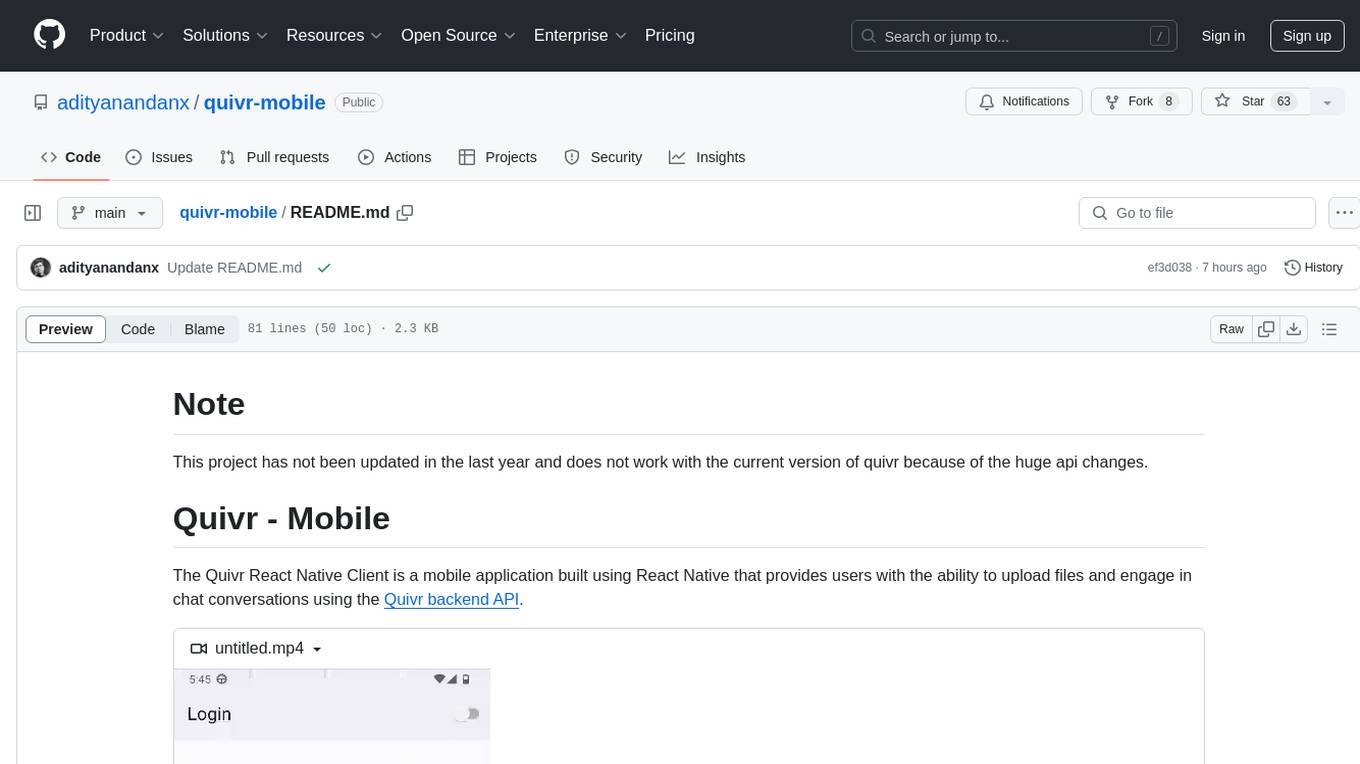
quivr-mobile
Quivr-Mobile is a React Native mobile application that allows users to upload files and engage in chat conversations using the Quivr backend API. It supports features like file upload and chatting with a language model about uploaded data. The project uses technologies like React Native, React Native Paper, and React Native Navigation. Users can follow the installation steps to set up the client and contribute to the project by opening issues or submitting pull requests following the existing coding style.
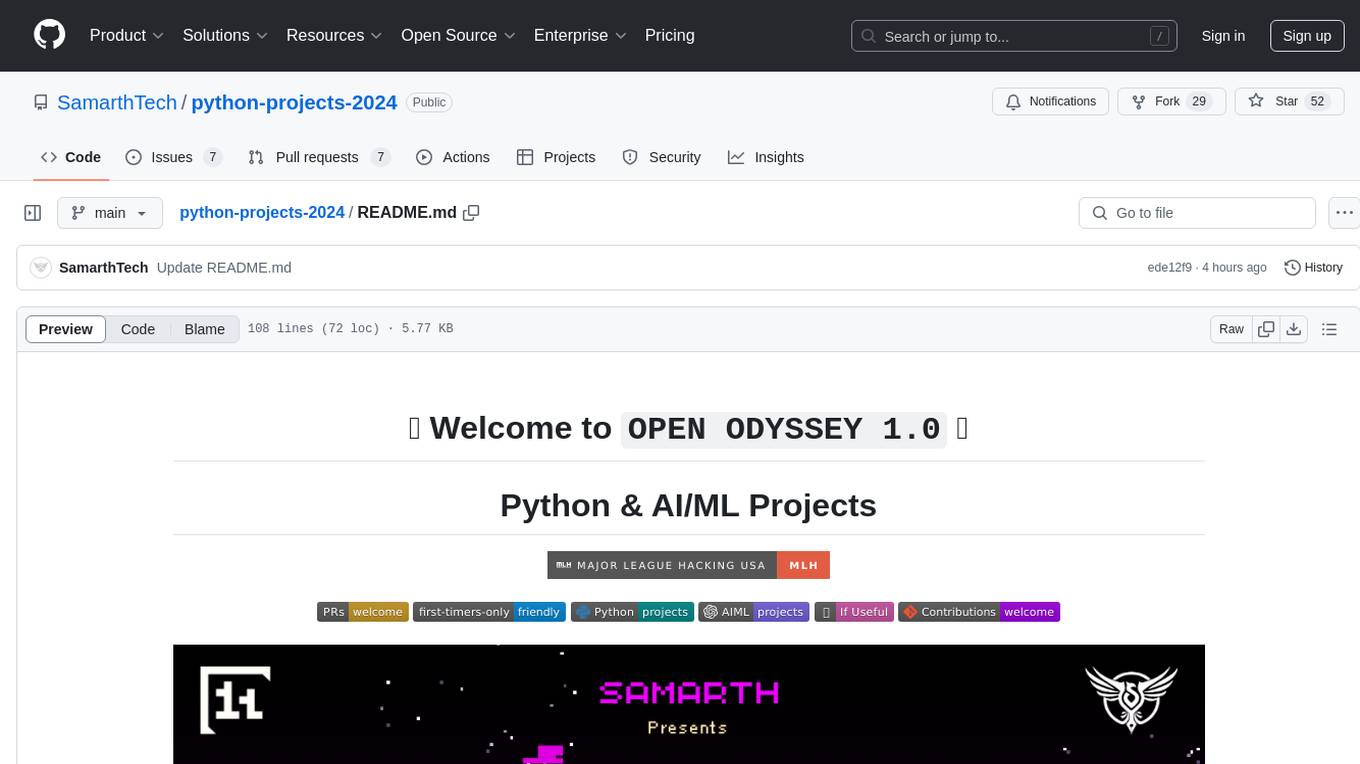
python-projects-2024
Welcome to `OPEN ODYSSEY 1.0` - an Open-source extravaganza for Python and AI/ML Projects. Collaborating with MLH (Major League Hacking), this repository welcomes contributions in the form of fixing outstanding issues, submitting bug reports or new feature requests, adding new projects, implementing new models, and encouraging creativity. Follow the instructions to contribute by forking the repository, cloning it to your PC, creating a new folder for your project, and making a pull request. The repository also features a special Leaderboard for top contributors and offers certificates for all participants and mentors. Follow `OPEN ODYSSEY 1.0` on social media for swift approval of your quest.
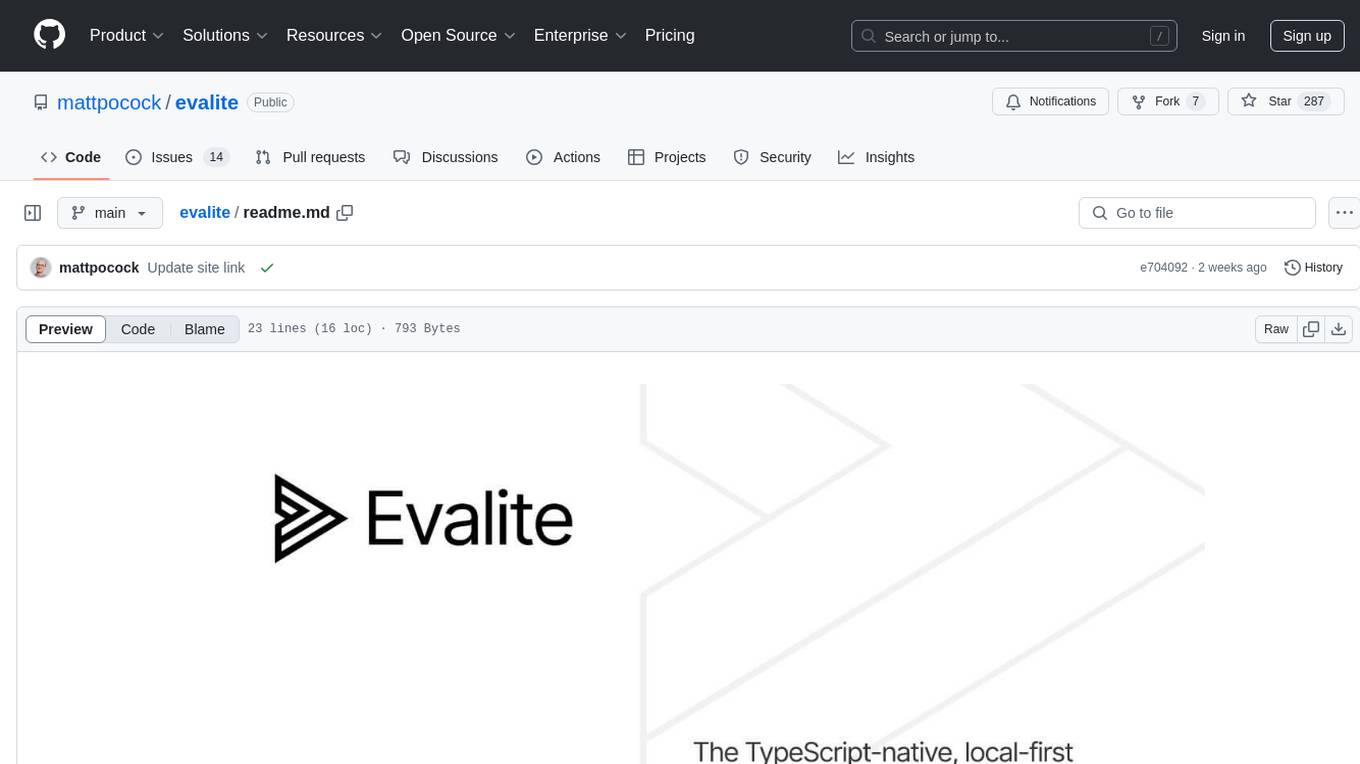
evalite
Evalite is a TypeScript-native, local-first tool designed for testing LLM-powered apps. It allows users to view documentation and join a Discord community. To contribute, users need to create a .env file with an OPENAI_API_KEY, run the dev command to check types, run tests, and start the UI dev server. Additionally, users can run 'evalite watch' on examples in the 'packages/example' directory. Note that running 'pnpm build' in the root and 'npm link' in 'packages/evalite' may be necessary for the global 'evalite' command to work.
For similar jobs

sweep
Sweep is an AI junior developer that turns bugs and feature requests into code changes. It automatically handles developer experience improvements like adding type hints and improving test coverage.

teams-ai
The Teams AI Library is a software development kit (SDK) that helps developers create bots that can interact with Teams and Microsoft 365 applications. It is built on top of the Bot Framework SDK and simplifies the process of developing bots that interact with Teams' artificial intelligence capabilities. The SDK is available for JavaScript/TypeScript, .NET, and Python.

ai-guide
This guide is dedicated to Large Language Models (LLMs) that you can run on your home computer. It assumes your PC is a lower-end, non-gaming setup.

classifai
Supercharge WordPress Content Workflows and Engagement with Artificial Intelligence. Tap into leading cloud-based services like OpenAI, Microsoft Azure AI, Google Gemini and IBM Watson to augment your WordPress-powered websites. Publish content faster while improving SEO performance and increasing audience engagement. ClassifAI integrates Artificial Intelligence and Machine Learning technologies to lighten your workload and eliminate tedious tasks, giving you more time to create original content that matters.

chatbot-ui
Chatbot UI is an open-source AI chat app that allows users to create and deploy their own AI chatbots. It is easy to use and can be customized to fit any need. Chatbot UI is perfect for businesses, developers, and anyone who wants to create a chatbot.

BricksLLM
BricksLLM is a cloud native AI gateway written in Go. Currently, it provides native support for OpenAI, Anthropic, Azure OpenAI and vLLM. BricksLLM aims to provide enterprise level infrastructure that can power any LLM production use cases. Here are some use cases for BricksLLM: * Set LLM usage limits for users on different pricing tiers * Track LLM usage on a per user and per organization basis * Block or redact requests containing PIIs * Improve LLM reliability with failovers, retries and caching * Distribute API keys with rate limits and cost limits for internal development/production use cases * Distribute API keys with rate limits and cost limits for students

uAgents
uAgents is a Python library developed by Fetch.ai that allows for the creation of autonomous AI agents. These agents can perform various tasks on a schedule or take action on various events. uAgents are easy to create and manage, and they are connected to a fast-growing network of other uAgents. They are also secure, with cryptographically secured messages and wallets.

griptape
Griptape is a modular Python framework for building AI-powered applications that securely connect to your enterprise data and APIs. It offers developers the ability to maintain control and flexibility at every step. Griptape's core components include Structures (Agents, Pipelines, and Workflows), Tasks, Tools, Memory (Conversation Memory, Task Memory, and Meta Memory), Drivers (Prompt and Embedding Drivers, Vector Store Drivers, Image Generation Drivers, Image Query Drivers, SQL Drivers, Web Scraper Drivers, and Conversation Memory Drivers), Engines (Query Engines, Extraction Engines, Summary Engines, Image Generation Engines, and Image Query Engines), and additional components (Rulesets, Loaders, Artifacts, Chunkers, and Tokenizers). Griptape enables developers to create AI-powered applications with ease and efficiency.





